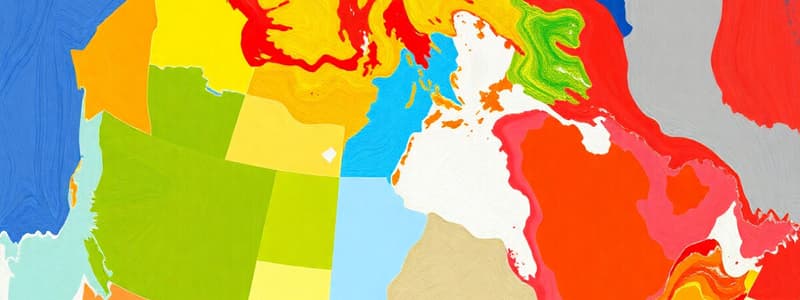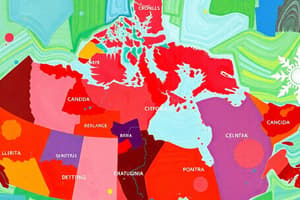Podcast
Questions and Answers
Which of the following accurately describes a province in Canada?
Which of the following accurately describes a province in Canada?
- Is treeless with permanently frozen ground
- Governed by the national government
- Contains a large area of flat land composed of ancient rock
- Is a unit similar to a state (correct)
Canada has more territories than provinces.
Canada has more territories than provinces.
False (B)
What type of climate is associated with the Atlantic Provinces of Canada?
What type of climate is associated with the Atlantic Provinces of Canada?
Humid continental
The _____ consists of a group of islands.
The _____ consists of a group of islands.
Match the following regions of Canada with their primary characteristics:
Match the following regions of Canada with their primary characteristics:
Which climate is typical of the Prairie Provinces?
Which climate is typical of the Prairie Provinces?
The Arctic Ocean brings moderate temperatures to Northern Canada.
The Arctic Ocean brings moderate temperatures to Northern Canada.
What type of trees are coniferous trees?
What type of trees are coniferous trees?
Flashcards
Canadian Shield
Canadian Shield
A large area of flat land made up of very old, hard rock.
Archipelago
Archipelago
A group of islands.
Coniferous
Coniferous
A type of evergreen tree with cones instead of leaves.
Deciduous
Deciduous
Signup and view all the flashcards
Tundra
Tundra
Signup and view all the flashcards
Province
Province
Signup and view all the flashcards
Territory
Territory
Signup and view all the flashcards
Atlantic Ocean's influence
Atlantic Ocean's influence
Signup and view all the flashcards
Study Notes
Vocabulary
- Province: A unit similar to a state.
- Territory: Land governed by the national government.
- Shield: A large area of flat land composed of ancient, hard rock.
- Coniferous: Evergreen trees with cones and needles, not leaves.
- Deciduous: Trees that shed their leaves in autumn.
- Archipelago: A group of islands.
- Tundra: A flat, treeless plain with permanently frozen ground.
Key Facts
- Canada is a large country with a relatively low population, predominantly concentrated in the south.
- Canada has 10 provinces, each with its own government, similar to U.S. states.
- Canada has 3 territories governed by the national government.
Regions of Canada
- Atlantic Provinces: Located along the Atlantic Ocean, featuring highlands, lowlands, and plateaus; a humid continental climate.
- Quebec & Ontario: Start at the St. Lawrence River, encompassing Great Lakes; characterized by a lowland plain, Canadian Shield, and forests; experiencing a humid continental climate, including a subarctic region.
- Prairie Provinces: Located in mid-western Canada, featuring plains, highlands, Canadian Shield, and Canadian Rockies; experiencing a subarctic climate with cool summers and a long winter.
- British Columbia: Situated on the west coast, between the Coast Range and Rocky Mountains, featuring plateaus, valleys, and mountains; experiencing a marine west coast climate.
- Northern Lands: Stretching from the East coast to the West coast, including a variety of landforms like mountains, islands, and plains; experiencing a subarctic climate with tundra.
Oceans and Their Effect on Canada
-
Atlantic: East coast moderate temperatures in Eastern Canada.
-
Pacific: West coast, bringing rain and mild temperatures to Western Canada.
-
Arctic: Northern Canada, bringing cold temperatures.
-
Significance of Oceans: Oceans are vital for shipping goods and supporting fisheries. The Gulf of St. Lawrence and the St. Lawrence Seaway enable inland shipping.
-
Shared Resources: Canada shares four of the five Great Lakes with the United States, along with other important lakes and the Mackenzie River.
Studying That Suits You
Use AI to generate personalized quizzes and flashcards to suit your learning preferences.




